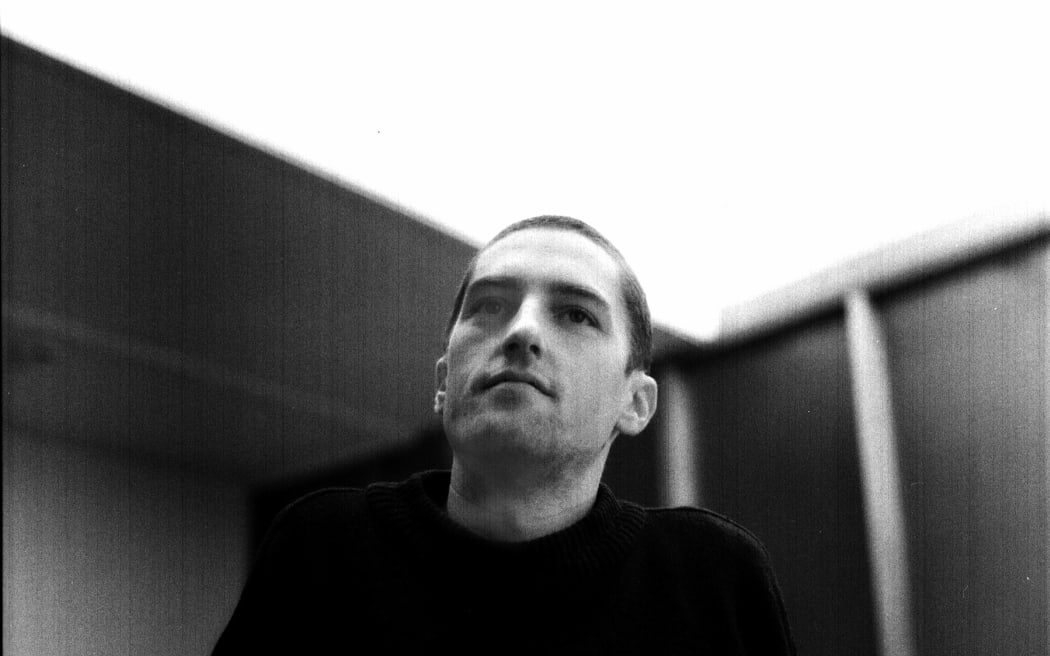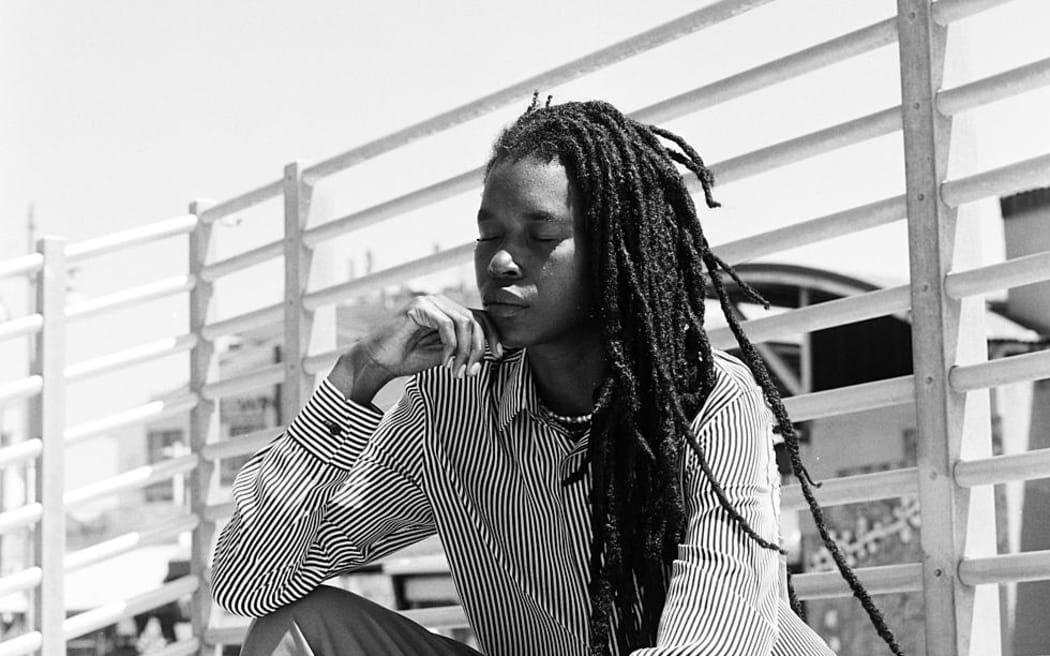Tony Stamp explores a mix of taonga pūoro and electronic sounds on the debut of Pōneke’s Te Kahureremoa, a second album of Antipodean gothic from Ōtautahi’s Ben Woods, and an exploration of jazz’s past and future by Moor Mother.
Acts of Service by Te Kahureremoa

Photo: Te Kahureremoa
A new album has arrived by a Pōneke musician with an intimidating number of strings to her bow. She’s a visual artist, an interactive educator, and a taonga pūoro performer, in addition to a singer-songwriter, and does all these things with the ease of someone who’s worked hard at them.
She used to make music as Ladyfruit, but this album, Acts of Service, is released under her real name Te Kahureremoa.
Acts of Service was produced by Neil MacLeod, who she met when they worked on a Pride show together. You can hear his backing vocals throughout the album. The two working in conjunction reminds me of the partnership between Moana Maniopoto and Paddy Free - a mix of modern sounds with traditional songwriting, and an infusion of te ao Māori.
The drama of ‘Ōrongonui’ evokes another wāhine Māori songwriter: Ria Hall. This album’s name Acts of Service also pairs nicely with Hall’s Rules of Engagement.
‘Patupaiarehe’ might be the album’s best showcase of taonga pūoro, alongside Te Kahureremoa’s acoustic guitar and the kind of crisp electronic production that appeared in her Ladyfruit songs.
Te Kahureremoa Taumata grew up in a te reo-speaking house, with musicians like Hirini Melbourne often on the stereo. It was after she enrolled in a musicology paper at uni, where she attended a wānanga and received a kōauau, that she took up playing taonga pūoro.
She told 95bFM recently she wanted it to be the basis of these songs, not an afterthought. She said even if you’re not hearing it, every melody was created on a traditional Māori instrument.
There’s gravity to these songs, but Te Kahureremoa has a light touch when it comes to lyrics and the way she slips in and out of a rap delivery. I’m pretty sure the line “anything you can do I can do bleeding” on the song ‘Bloodmoon’, is a playful bit of feminism. 'Takura' mentions taking the high road and showing no stress, and that shines through too.
She’s one half of storytelling duo Timotimo, with Khali Phillips-Barbara. They perform at schools, kura kaupapa and community spaces, using taonga pūoro, waiata, and karetao (puppetry), using the philosophy of Te Whare Tapere (iwi-community houses employing pre-European modes of entertainment).
That background is maybe why each song on Acts of Service communicates its ideas with crystal clarity, like the ode to wāhine Māori, ‘Toro Atu Tō Ringa’.
Acts of Service is an album that caught me off guard in the best possible way. It’s housed in its own well-realised sound world, thanks to the collaboration between Te Kahureremoa and Neil MacLeod, and is delivered with the confidence of someone who’s fully aware of themselves and their gifts.
Te Kahureremoa Taumata is someone with a lot going on creatively, but I hope this project continues for some time.
Dispeller by Ben Woods

Photo: Ben Woods
More than anything, Ōtautahi musician Ben Woods strikes me as someone in complete control of his sound. Every squawk of feedback or burst of distortion is very intentional - there to subvert or compliment his ornately gloomy songs.
There are echoes of great songwriters throughout his new album Dispeller, but it’s the intentionally jarring sound design, coupled with a sense of self-awareness, that mark him as great in his own right.
The album is constructed around live instrumentation, but its sounds are never straightforward. On ‘The Strip’ the guitars shudder with tremolo, and there’s the threat of eruption that never quite comes. Instead, a few twinkling piano notes ring out.
These tracks are anchored by Woods' wavering baritone. Speaking about his last album he said “I found my voice in trying to make atonality croon”.
I think he’s being self-deprecating, but it does speak to his interest in using noise as part of songwriting.
The ghost of fellow baritone legend Scott Walker looms large over proceedings, and is name-checked in Dispeller’s PR, as is Sparklehorse, another departed musician who shares Woods' interest in pairing classic songwriting with layers of burbling tape loops, or in the case of ‘Trace Reel’, an unidentified drone that vanishes when the rhythm section kicks in.
The album was recorded in Lyttelton by the famed producer Ben Edwards, who has helmed records for Nadia Reid, Marlon Williams and plenty more.
Musicians from around the country make appearances, including underground legend Alistair Gailbraith, Charlotte Forrester of Womb, and on the track ‘Wearing Divine’, Lucy Hunter from Opposite Sex, and Marlon Williams, who arrives in a climactic choral arrangement, distorted beyond recognition.
There’s more than a little Velvet Underground to the chord progression in that one, and Woods shares Lou Reed’s emotive semi-detachment. He’s also a dab hand at lyrics that balance crypticism and meaning, in that song singing “I need you wholly, please just stitch me up”.
On ‘Hovering at Home’, he says “I buried the bread that I threw to the hounds”, and I have no idea what he means, but the way he delivers it tells me it means something.
Ben Woods's debut album PUT was funded in part by volunteering for drug research trials (not the only local musician I know who’s had to resort to this to pay for their art). That album evoked ‘Antipodean Gothic’ in its liner notes, and it's hard to argue against the description.
The songs on Dispeller aren’t always glum, but they are always intense, even when they’re quiet. Woods would be a compelling singer-songwriter even without his interest in atonality and noise. But having the confidence to combine the inviting with the challenging is what makes his music special.
Jazz Codes by Moor Mother

Photo: Moor Mother
Perhaps the most important thing to know about the Maryland-born poet Moor Mother is that she was awarded a residency at CERN, the European Organisation for Nuclear Research. She and her collaborator Rasheedah Phillips, who use the name Black Quantum Futurism, will explore “the ways in which quantum physics can influence how people think about, experience and measure time in everyday reality”.
Moor Mother is concerned with time. On the last track on her new release Jazz Codes, poet Thomas Stanley suggests jazz died because it didn’t fit into capitalism’s design. The album seeks to explore jazz’s roots as an explicitly Black artform and look at the way it’s embedded in modern genres, erasing the line between past and future as it goes.
'Moor Mother' is the nom de plume of Camae Ayewa - poet, songwriter, visual artist and professor at the University of Southern California's Thornton School of Music. Pitchfork called her “the poet laureate of the apocalypse”. She calls her music “Back ghost songs”.
Her 2016 debut Fetish Bones sent a shock wave through a certain type of music fan - it’s intentionally chaotic and abrasive. Her sound has mellowed since but still deals in sonic maximalism.
Jazz Codes is a dizzying ride, packed with genres, samples, and trains of thought over its whopping 18 tracks. It also has a generous roster of over a dozen guests - on ‘Umzansi’ we hear harp player Mary Latimore, and ‘Golden Lady’ features the singing voice of Melanie Charles.
The album began as a book of poetry. It was to be accompanied by jazz loops from Swedish producer Olof Melander, who initially sent Moor Mother around 100 tracks. As lockdown progressed she contacted more musicians and wove them into the mix, and the result has her spoken word guiding us through this flurry of sounds and ideas, which pays tribute to jazz legends as it goes - Billy Holiday, Nina Simone and more are mentioned, and titles pay tribute to Woody Shaw, Amina Claudine Myers, and on ‘Ode to Mary’, Mary Lou Williams.
Some of Moor Mother’s ideas are easy to grapple with, like the elevation of Black women from housing projects, like herself. Others are much more cerebral, like her description of “Black quantum futurism” as “exploring sound’s potential to evoke memories as a vehicle for navigating time”.
Speaking about her collaborators, none of whom heard each other’s contributions to Jazz Codes, she said "I'm trying to get rid of people's timelines, to get rid of people's doomsday calendars — this speeding through life and reality”.
The album pays tribute to jazz in ways that are literal as well as spiritual - “not named but felt” is how she puts it. It’s a record that is, in its own specific way, timeless.

